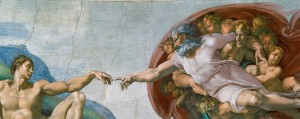 I would love to go to Rome, to the Vatican City, and visit the Sistine Chapel where I would stand and look up and behold this fresco painting by Michelangelo in person.
I would love to go to Rome, to the Vatican City, and visit the Sistine Chapel where I would stand and look up and behold this fresco painting by Michelangelo in person.
This painting is called the Creation of Adam and it was painted around 1511–1512. It is part of a series of nine scenes illustrating the book of Genesis.
Next to the Mona Lisa, by Leonardo da Vinci, it is most likely the most famous work of art of all time.
There is much symbolism in this painting:
- God’s right hand extending out and Adam’s left – suggesting a mirror image– and illustrating the truth that God created man in His own image and likeness.
- God is clothed, while Adam is nude – symbolizing God is all sufficient and complete, while man begins as nothing and is on a journey.
- God, the creator and giver of life, points toward Adam. He is above Adam – not his equal.
- God is the Creator, Adam the created.
Michelangelo used a painting technique called fresco when he painted the Sistine Chapel ceiling. Fresco is defined as painting on wet plaster. When the plaster dries, the painting is bonded to the wall. This method was chosen by artists because it was more permanent than painting on dry plaster. The finished product is not just on the wall, but becomes part of the wall.
The challenge, of course, is that the artist must work quickly – before the plaster dries and hardens. There is a finite amount of time. The artist must make his decisions and paint his strokes…tell his story…while the plaster is wet. Once it hardens, it cannot be changed.
Our lives on earth can be compared to wet plaster. We, too, have a finite amount of time to make our choices and our decisions before we breathe our last and the plaster of our life is set and our destiny for eternity is determined.
Throughout history every individual is given time to choose. The mighty Pharaoh himself was given his opportunity to decide. He allowed the plaster of his heart to harden towards God…and then it became too late. God gave Him over to his own choices.
If you are reading along with us this year, perhaps Exodus chapters 7-11 also finds you grappling with some hard questions as I am. Questions like:
- Did Pharaoh harden his own heart…or did God harden it for him?
- Why can God hold Pharaoh responsible for his hard heart…when the Scripture says God himself did the hardening in some instances?
- If God is sovereign and planned to free the Israelites, then why were the plagues even necessary?
- Pharaoh confessed his sin, but then hardened his heart – what, then, is real confession?
I pray that this week’s teaching lecture will help answer some of these questions for you. You can follow the link below.
I am also praying that you and I are spurred on to keep our hearts soft and pliable and teachable before God.
Our lives on earth are for a finite amount of time. We have a seemingly short opportunity to respond to the call of Christ — to repent and bow to Him. Jesus says in Revelation 3:20, “Behold, I stand at the door and knock; if anyone hears My voice and opens the door, I will come in to him…”
If you have not yet opened the door of your heart to Jesus, why not make today the day that you respond to Him.
Hebrews 3:7-8 says, “So, as the Holy Spirit says: “Today, if you hear his voice, do not harden your hearts.”
Is your heart soft toward God? As a woman of God are you cooperating with God – allowing Him to paint your story as a part of His story…so that it is so adhered to Him that it cannot be separated? If you love Jesus, you are permanently and completely and forever His. You are a woman of God!
Here’s the link to the teaching lecture for Exodus 7-11 (Lesson 5 of our study):
http://fbcsiloam.podbean.com/e/ladies-bible-study-exodus-lesson-5-laura-macfarlan-10-9-14/
Graphic attribution and background information on the painting: Wikipedia.com


